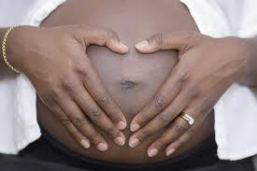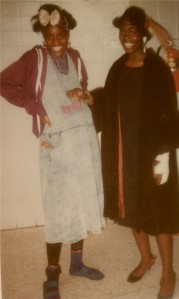Sent to you by moya via Google Reader:
 "Fish dreams signal pregnancy in my family. The premonition, which was mostly my grandmother's or another maternal figure, has been consistent and accurate for as long as I can remember. All girl children were implicated by any dream that featured fish. . ." said CF Rboylorn, Fish Dreams and Fantasies: Contemplating Motherhood.
"Fish dreams signal pregnancy in my family. The premonition, which was mostly my grandmother's or another maternal figure, has been consistent and accurate for as long as I can remember. All girl children were implicated by any dream that featured fish. . ." said CF Rboylorn, Fish Dreams and Fantasies: Contemplating Motherhood.
There have been no fish dreams for me. There is a stork-less stark reality that my 2-hour treks to an expensive specialist to be jacked open, probed, and drugged, and my regimented record keeping about peek ovulation, period flow, body temperature, and patterned intercourse over the course of two years might still result in the inconceivable: infertility.
As a child, I did not crave a Cabbage Patch to cuddle when imagining a "play play" family with girlfriends. I used my "play play" Barbie as a mannequin to model clothes made from remnants by my mother, who purchased my miniature sewing machine from a nearby Goodwill thrift store. I learned how to sew before I learned how to cook. My mother and my aunties indulged my creativity by asking to hear my latest poems or to see my latest designs in my so-called fashion portfolio. Most important, these womenfolk praised my elementary adoption of the closed-leg policy. I learned I could garner the spotlight and count on their unconditional support if I evaded the cardinal sin of black girlhood: pregnancy.
Early pregnancy seemed to be a dream-stealer. The praise I received was always accompanied by a cautionary tale about one Future swaddled and later abandoned because of the immediate demands of motherhood. I became so terrified of pregnancy that I developed anxiety at the very anticipation of holding a baby. To this day, I can count on one hand the number of babies that I have held in my lifetime. A junior high school yearbook photo from Halloween illustrates how I imagined pregnancy as horrifying (and somewhat humorous). Twenty years later, I am not only confronting prevailing cultural myths about black female hyperfertility and hypersexuality, I am also coming face-to-face with my childhood fears and my grown up fantasies.
"The possibility of having a baby scares me, but the impossibility scares me more," said CF Rboylorn.
I escaped the social stigma surrounding urban teen pregnancy only to bump up against another one regarding Black female infertility at thirty. Uterine fibroids (or noncancerous tumors), endometriosis (characterized by tissue growing outside the uterus), and untreated diseases (tragically depicted in the film For Colored Girls) are medical conditions that adversely impact our reproductive health. Black women are less likely to receive an early diagnosis of infertility or seek medical treatment because of the escalating costs and powerful cultural myths. Much of the public visibility and value ascribed to Black women is based on our perceived role as mother. Whether the endearing mammy celebrated in early forms of popular culture or the bad black mother (e.g., teen mother, crack mother, welfare queen) demonized in news media since the 1980s, she is still a mother. To add, our very theories of womanism and black feminist thought use (other)mothering as frameworks to describe how black women engage with the world. These frameworks do provide broader understandings of mothering as a communal act, yet with so much meaning attached to motherhood, the inability to conceive or carry a pregnancy to term can be a devastating and demoralizing experience for some Black women.
It has been for me. I have experienced shame, anxiety, and depression. I did not seek support because I believed I could bear it, so says my inner strongblackwoman. For a moment, I believed my infertility was spawned by my inability to perform perfect would-be motherhood—window shopping, name surfing, and publicly gooing over all-things-baby. For a moment, I convinced myself that my book—my professional baby—was undeliverable because of all of its imperfections. I convinced myself that I was unproductive. For a moment, I participated in the suffocating silence because I felt I had no permission to speak freely about my experiences—those tragic and triumphant. I spent months alone with my bare feet cuffed inside icy metal stirrups, staring at one-too-many ultrasound monitors because I believed that time would be the time. It was only a month ago when I allowed two years of tears to wash over me during an 8-hour cry-fest with a girlfriend. I released the pressure to conceive that was bottled inside me. It was a baptism of sorts. My sistahfriend lovingly sent me home with my grand mother, Yemaya, and these days I feel at peace on my path. This week I will return to the cold white room with the monitor staring at me. This time, however, I will fold into myself to imagine my own rebirth.
Infertility affects more than 7 million people. For helpful information about infertility, reproductive health, and support networks in your community, please visit:
The American Fertility Association
The National Survey for Family Growth
Resolve: The National Infertility Association
In celebration of the CFC one-year anniversary, this post was generated as the "B" side to Fish Dreams and Fantasies: Contemplating Motherhood.
Things you can do from here:
- Subscribe to The Crunk Feminist Collective » Inconceivable: Black Infertility using Google Reader
- Get started using Google Reader to easily keep up with all your favorite sites
.jpg)


No comments:
Post a Comment